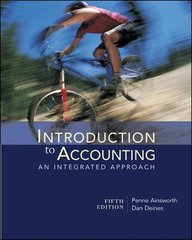Question
Mr. A and Mr. C are partners in a local food catering business named BBQ City. Their business currently generates $100,000 per year in sales.
Mr. A and Mr. C are partners in a local food catering business named BBQ City. Their business currently generates $100,000 per year in sales. They are considering making an investment in a portable BBQ smoker. The smoker comes in two different models: The Model 100 and the Model 200. Because both models of the BBQ smokers are portable, the catering company will be able to increase the distance they can travel to serve their customers. This means that the company will be able to increase its sales (see below). The company's tax rate is 35%. The company's current structure is such that a $1 increase in sales will increase its EBDT by $0.32. The company uses 15% as its required rate of return (cost of capital) for evaluating new projects.
The Model 100 has only half the capacity of the Model 200. Cost to purchase the machines is $13,000 (Model 100) and $22,000 (Model 200). The machines are depreciable under the 5-year modified accelerated cost recovery system (MACRS) depreciation schedule (see below). The company feels that any potential investment project should be evaluated based on a five-year sales forecast.
The expected increase in sales is different, depending on which model is being considered. Because of smaller capacity, the Model 100 will not allow the company to accept catering jobs for groups above a certain size. The expected sales increase for each model is as follows:
Expected Increase in Sales
Year 1
Year 2
Year 3
Year4
Year 5
Model 100
$10,000
$12,000
$15,000
$15,000
$15,000
Model 200
$18,000
$23,000
$25,000
$36,000
$43,000
The investments are mutually exclusive. In other words, the company must choose only one. Which model should the company invest in? Set up the appropriate cash flows for each model. Calculate payback, internal rate of return (IRR), and net present value (NPV) for each model, based on the above sales forecast. Justify your recommendation, based on your calculation of these numbers. For your reference the MACRS depreciation schedule for a 5-year asset is as follows:
Yr1.20
Yr2.32
Yr3.192
Yr4.115
Yr5.115
Yr6.058
Step by Step Solution
There are 3 Steps involved in it
Step: 1

Get Instant Access to Expert-Tailored Solutions
See step-by-step solutions with expert insights and AI powered tools for academic success
Step: 2

Step: 3

Ace Your Homework with AI
Get the answers you need in no time with our AI-driven, step-by-step assistance
Get Started


